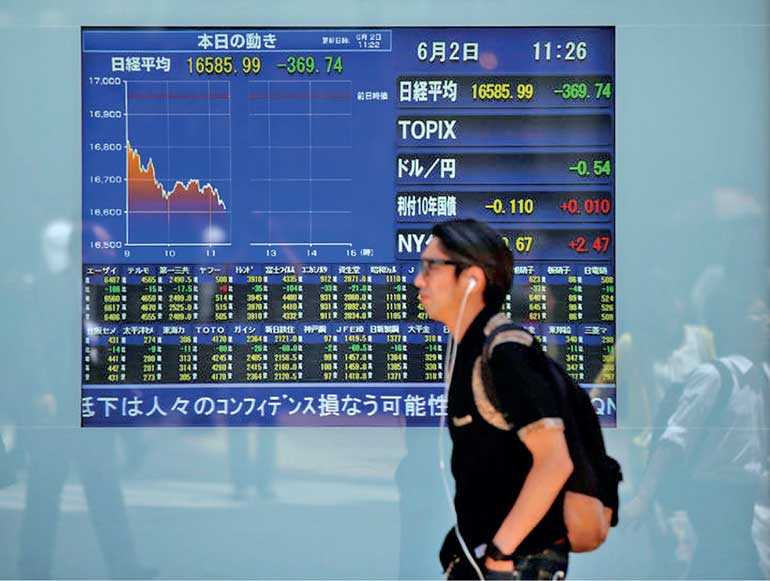Monday Feb 23, 2026
Monday Feb 23, 2026
Friday, 31 August 2018 00:10 - - {{hitsCtrl.values.hits}}
TOKYO (Reuters): Asian stocks handed back earlier gains and fell on Thursday, with Chinese markets fixed firmly on risks from the China-U.S. trade war and taking little comfort from an apparent easing in business tensions in North America and Europe.
Spreadbetters expected European stocks to open mixed, with Britain’s FTSE and Germany’s DAX each slipping about 0.1% and France’s CAC inching up 0.05%.
The leaders of the United States and Canada expressed optimism on Wednesday that NAFTA negotiations would meet a Friday deadline for a deal, days after the U.S. and Mexico reached a bilateral agreement.
But MSCI’s broadest index of Asia-Pacific shares outside Japan dropped 0.3%, with broad gains across the region offset by losses in China.
The Shanghai Composite Index slid 0.9% and Hong Kong’s Hang Seng fell 0.8%.
“Investors are relatively pessimistic and cautious for now amid low levels of trading volume, as there are still concerns over the development of the Sino-U.S. trade spat,” said Yan Kaiwen, an analyst with China Fortune Securities.
U.S. tariffs on another $200 billion of Chinese goods are expected to take effect later next month.
Australian stocks were effectively flat. Japan’s Nikkei initially touched a three-month high following gains on Wall Street but pared gains and was last up a modest 0.05%.
South Korea’s KOSPI was a shade lower. Major South Korean steelmakers such as POSCO and Hyundai Steel, however, gained after news that U.S. President Donald Trump signed a proclamation permitting targeted relief from steel and aluminium quotas from countries including South Korea.
U.S. shares extended their rally on Wednesday, with the S&P 500 and the Nasdaq hitting record highs for a fourth straight session as technology stocks pushed indexes higher and promising NAFTA negotiations boosted investor confidence.
Canada rejoined the talks to modernise the 24-year-old NAFTA after Mexico and the United States announced a bilateral trade deal on Monday, which had helped global equities begin the week on stronger footing.
The White House has said it wants to settle NAFTA before negotiating with China.
The pound stood tall as fears of a ‘hard Brexit’ eased after the European Union’s chief exit negotiator signalled an accommodative stance towards London in ongoing talks.
Sterling rose to a 3-1/2-week high $1.3039, extending its gains after surging more than 1% overnight.
The dollar index against a basket of six major currencies struggled near a four-week low of 94.434 plumbed on Tuesday, weighed by the pound’s rally.
The greenback has also been on the defensive this week with safe-haven demand for the currency diminishing in the wake of improving risk sentiment in broader markets.
The euro was 0.15% lower at $1.1693, handing back the previous day’s gains. The dollar was flat at 111.65 yen after rising 0.4% overnight.
The Chinese yuan lost about 0.2%, touching a six-day low of to 6.8332 per dollar in onshore trade.
Investors kept a wary eye on the Turkish lira, which stretched losses and retreated to a two-week trough after Moody’s on Wednesday downgraded 20 Turkish banks in a further blow to a country already gripped by a financial crisis and stuck in a diplomatic row with the United States.
Other struggling emerging market currencies in focus included Argentina’s peso. The peso tumbled overnight to a record low against the dollar after Argentine President Mauricio Macri asked the International Monetary Fund (IMF) for early assistance, alarming investors.
The IMF said it was studying the request from Argentina to speed up disbursement of the $50 billion loan programme.
In commodities, Brent crude futures rose 0.2% to $77.28 per barrel and U.S. crude futures climbed 0.25% to $69.67 per barrel.
Oil contracts had risen more than 1% on Wednesday, supported by a drawdown in U.S. crude and gasoline stocks and as U.S. sanctions reduced Iranian crude shipments.